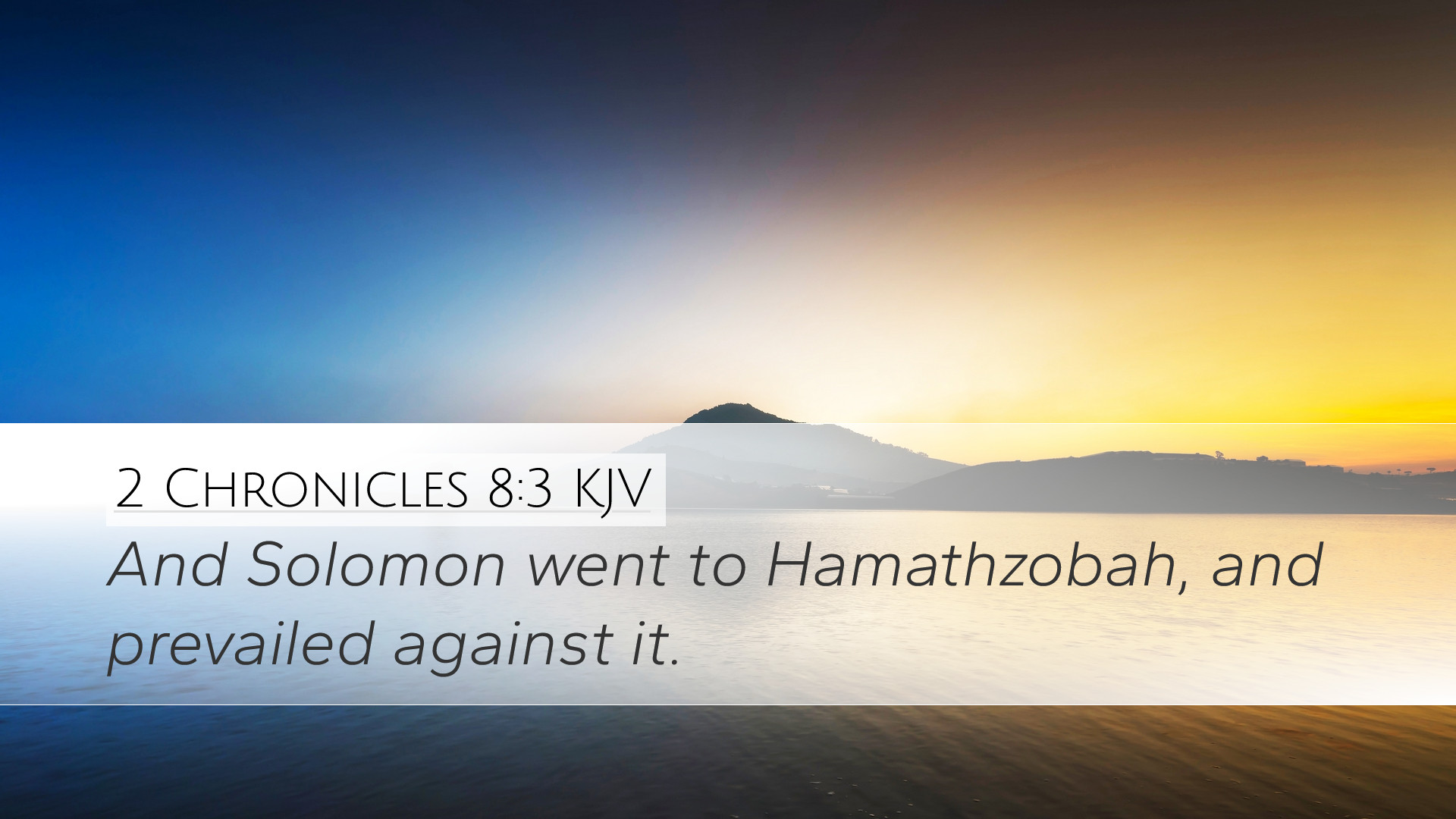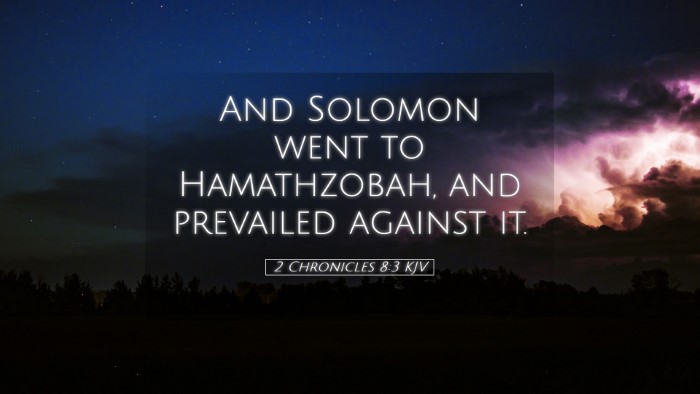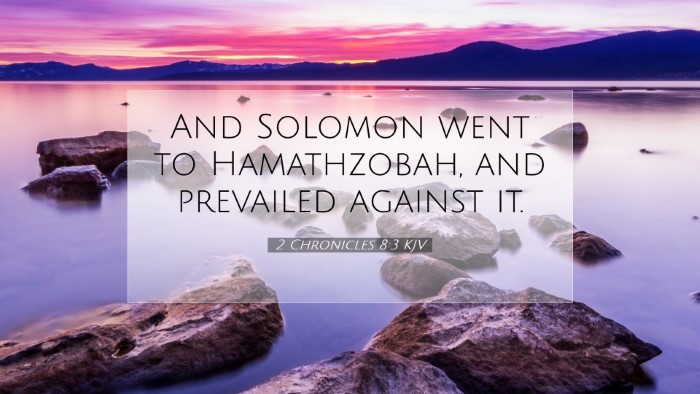Commentary on 2 Chronicles 8:3
Verse Reference: 2 Chronicles 8:3 - "And Solomon went to Hamathzobah, and prevailed against it."
Introduction
This verse reflects a significant moment in the reign of Solomon, highlighting his military prowess and the expansion of the kingdom during a time of peace and prosperity. With insights drawn from the esteemed public domain commentaries of Matthew Henry, Albert Barnes, and Adam Clarke, we shall explore the intricacies of the narrative, its historical context, and the theological implications for today’s readers, including pastors, theologians, and students of the Scriptures.
Historical Context
The events described in 2 Chronicles are set within a broader historical framework where Solomon seeks to solidify his kingdom and extend its borders. The mention of Hamathzobah is particularly noteworthy as it represents both a military challenge and a strategic victory for Solomon.
- Strategic Significance: Hamathzobah was a fortified city on the northern frontier, which posed a potential threat to Israel’s security. By conquering this city, Solomon not only expanded his territory but also secured his northern borders.
- Military Pursuits: This verse highlights Solomon’s military expeditions, which are critical for understanding the might and influence of his reign. The narrative illustrates how Solomon’s wisdom extended beyond governance into military strategy.
Theological Insights
The conquest of Hamathzobah encapsulates various theological themes that resonate throughout Scripture, emphasizing God’s sovereignty and faithfulness in the establishment of His kingdom.
- Divine Authority: Henry emphasizes that Solomon’s victories were ordained by God, reinforcing the belief that the true source of power and authority rests with the Lord (Psalm 127:1). The expansion of Solomon’s kingdom serves as a testament to God’s promise to David regarding his dynasty.
- Righteous Leadership: Albert Barnes notes that Solomon’s military actions must be viewed through the lens of righteous leadership. Solomon, being a wise and just king, undertakes these conquests not for personal glory but to maintain peace among his people and enforce God’s laws.
- Prophetic Fulfillment: Clarke observes how this event contributes to the fulfillment of God’s prophetic word to Israel regarding their territorial boundaries. It stands as a fulfillment of the promise that the nation would dwell in safety and prosperity under Solomon's rule.
Commentary Highlights
We will now delve deeper into the commentaries to extract valuable insights that provide a richer understanding of this verse.
Matthew Henry
Henry reflects on the strength of Israel under Solomon, noting that although Solomon was known for his wisdom, he was also a capable military leader. His comment emphasizes that the Lord’s favor enabled Solomon to prevail over Hamathzobah, a victory that showcases not just earthly might but divine blessing.
- Restoration of Power: Henry underscores how Solomon's victories restored Israel's status among neighboring nations. This historical restoration is symbolic of how God uses leaders to execute His grand designs.
- Symbol of the True King: The act of prevailing over adversaries can be reflective of the ultimate victory of Christ, the true King. Believers may interpret this narrative as a foreshadowing of Christ's reign which conquers sin and death.
Albert Barnes
Barnes brings attention to the geographical and cultural significance of Hamathzobah. He notes that this location was critical for controlling trade routes and that Solomon's strategic military decision was not only a show of strength but a well-calculated move for economic advantage.
- Military Expediency: Barnes elaborates on the notion that Solomon's military actions were calculated. This points to the importance of wisdom in leadership, a theme echoed throughout Proverbs and 1 Kings.
- Peace through Strength: Drawing from historical perspectives, Barnes criticizes the notion of peace established solely through military means; however, he acknowledges that sometimes strength is necessary to achieve lasting peace.
Adam Clarke
Clarke provides a detailed analysis of the term "Hamathzobah," emphasizing its meaning and relevance. He cites the city’s role not just as a military target but as a symbol of the nations surrounding Israel and their relationship with God’s chosen people.
- Symbolism of Conflict: Clarke expounds on the theological implications of conflict, relating it to the ongoing spiritual warfare faced by believers today, where the triumph of faith is essential against various adversities.
- Encouragement for Believers: He concludes by encouraging the faithful to draw strength from God, as the victories attributed to Solomon underscore the belief that triumphs are granted through divine assistance.
Application for Today
This passage, while historical, presents contemporary readers with powerful themes applicable to modern life. As pastors, theologians, and students of the Word reflect on 2 Chronicles 8:3, several applications can be drawn:
- Recognizing Divine Sovereignty: Understanding God’s hand in our victories encourages humility and reliance on His strength rather than our own.
- Wisdom in Leadership: Leaders should emulate Solomon’s dedication to justice and righteousness, grounding their decisions in wisdom and discernment.
- Hope in Conflict: Just as Solomon faced challenges, believers today can find hope and encouragement that, through faith and reliance on God, they too can prevail against the trials of life.
Conclusion
The narrative encapsulated in 2 Chronicles 8:3 serves as an invitation for deeper reflection on the implications of leadership, the importance of divine covenant, and the necessity for wisdom in all areas of life. The commentaries of Henry, Barnes, and Clarke offer a valuable lens through which to view not only the historical significance of Solomon’s conquest but also its theological depth that resonates through ages. As we engage with the text, may we continually seek to both understand and apply its truths within the framework of our own faith journeys.


